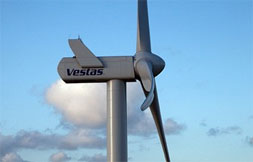Microsoft is using money from its corporate carbon fee for its first major renewable energy purchase – it is buying all the output from a wind farm in Texas.
Last year, the company began charging business divisions for the carbon they emit. Besides encouraging greater focus on efficiency inside the corporation, the money is used for efficiency projects and now, to buy renewable energy.
The company is modeling how a carbon tax would work were it ever to be adopted by the US.
Microsoft signed a 20-year power purchase agreement with RES Americas to buy all the energy from the Keechi Wind Project – 110 megawatts. Located about 70 miles north of Ft. Worth, the wind farm will send energy to the same electric grid that powers Microsoft’s data center in San Antonio.
Construction on Keechi begins early next year and will deliver energy starting in 2015. It consists of 55 wind turbines made by Vestas, mostly at its factory in nearby Colorado.

"For Microsoft, signing a long-term PPA for wind energy is a significant milestone in our commitment to carbon neutrality. It also underscores how the carbon fee is changing the way Microsoft does business globally. By placing a dollar value on a metric ton of carbon, Microsoft is building environmental sustainability into our long term business planning and creating a blueprint for more purchases of renewable energy like this one.
Because this is a new project, the energy generated there is "additional," which means that our purchase is bringing new renewable energy onto the Texas electric grid. And while Texas has a very robust wind energy industry, the majority of its energy generation still comes from coal and natural gas. By purchasing wind, we will reduce the overall amount of emissions associated with operating Microsoft facilities in this region and hopefully spur additional investment in renewable energy in Texas," says the company.
The company is also working to make its data centers more efficient – the one in San Antonio uses recycled waste water to cool the building (cooling is the biggest cost and biggest energy consumer in data centers).
It is also building a biogas-powered data center in Cheyenne, Wyoming – the first zero carbon data center that will be completely off the grid. Located next to a water treatment plant, biogas generated from waste water will power fuel cells, which in turn power the data center.
Rather than building a huge data center that takes enormous resources to power, this 200 kilowatt modular data center is the first to be sized to the amount of nearby fuel. Water treatment plants pair well with data centers because they’re both ‘always on’.
Greenpeace, which ranks the IT Industry every year on progress on sustainability, moved Microsoft up last year because it began advocating for renewables, by pushing for renewal of the wind production tax credit.
Now, the company says it’s making advocacy a habit by publicly posting its Global Public Policy Agenda each year. The idea is to communicate to government officials and stakeholders its "point of view on public policies that we believe benefit both Microsoft’s business and spur economic growth and help countries achieve their own national priorities."
This year, Microsoft began exerting pressure on its supply chain, requiring a cross section to report on their adherence to Microsoft’s Vendor Code of Conduct, which includes social and environmental policies. The information will be published in Microsoft’s annual Citizenship Report. As much as 60% of corporate greenhouse gas emissions originate in supply chains.
Microsoft is the second largest green power purchaser consumer in the US, doubling its purchase of renewable energy from 1.1 billion kilowatt hours (kWh) to 2.3 billion kWh last year. That means it’s buying enough clean energy for 80% of its electricity, but most of that is in the RECs – backing 15 projects elsewhere in the world.
Google, Apple, Facebook, Rackspace, Salesforce and Box have all committed to powering their data centers with 100% renewable electricity … that would be a great, next step for Microsoft, says Greenpeace.
Although Microsoft signed the Climate Declaration, which urges Congress to take bold action on climate change, it defends its support of ALEC, which strongly promotes the opposite.
"Our engagement with a particular group is not an endorsement of all the policy positions those groups have taken. For instance, we’ve received some questions about model legislation developed by the American Legislative Exchange Council that would repeal renewable energy mandates at the state level. To clarify this issue, Microsoft participates in ALEC’s Communication and Technology Task Force, as do many leading companies in the technology sector. We do not participate in any other ALEC task forces or provide any support or funding for ALEC’s work on environmental issues or other issues outside of communication and technology policy. In short, ALEC is not speaking for us on renewable energy policy."
From our point of view, paying dues to ALEC supports this most heinous organization, and participating in any of its committees gives ALEC credence it far from deserves. Unfortunately, Google and Facebook are also members. At the very least, these corporate leaders could use their position to influence ALEC if they chose to.
